
Colonialism, Antisemitism, and Germans of Jewish Descent in Imperial Germany examines the relationship between the colonial and antisemitic movements of modern Germany from 1871 to 1918, examining the complicated ways in which German antisemitism and colonialism fed off of and into each other in the decades before the First World War. Author Christian S. Davis studies the significant involvement with and investment in German colonialism by the major antisemitic political parties and extra-parliamentary organizations of the day, while also investigating the prominent participation in the colonial movement of Jews and Germans of Jewish descent and their tense relationship with procolonial antisemites.
Working from the premise that the rise and propagation of racial antisemitism in late-nineteenth-century Germany cannot be separated from the context of colonial empire, Colonialism, Antisemitism, and Germans of Jewish Descent in Imperial Germany is the first work to study the dynamic and evolving interrelationship of the colonial and antisemitic movements of the Kaiserreich era. It shows how individuals and organizations who originated what would later become the ideological core of National Socialism---racial antisemitism---both influenced and perceived the development of a German colonial empire predicated on racial subjugation. It also examines how colonialism affected the contemporaneous German antisemitic movement, dividing it over whether participation in the nationalist project of empire building could furnish patriotic credentials to even Germans of Jewish descent. The book builds upon the recent upsurge of interest among historians of modern Germany in the domestic impact and character of German colonialism, and on the continuing fascination with the racialization of the German sense of self that became so important to German history in the twentieth century.


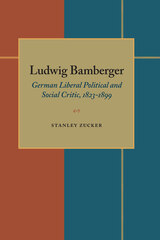
A political biography of a leading German liberal, this book carefully examines the life of Ludwig Bamberger from his university days in the 1840s until his death in 1899. Not only does it deal exhaustively with his career, it unfolds the major issues disputed in Germany during the latter half of the nineteenth century.: socialism, financial and political unification, parliamentarism, protectionism, and colonialism. Bamberger's career offers a vehicle to explore the political and social evolution of Germany, and his varied life illuminates the strength and weaknesses of German liberalism as it confronted and ultimately failed to overcome its competitors.
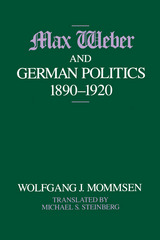
First published in German in 1959, Max Weber and German Politics appeared in a revised edition in 1974 and became available in an English translation only in 1984. In writing this work, Mommsen drew extensively on Weber's published and unpublished essays, newspaper articles, memoranda, and correspondence.
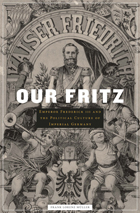
On June 15, 1888, a mere ninety-nine days after ascending the throne to become king of Prussia and German emperor, Frederick III succumbed to throat cancer. Europeans were spellbound by the cruel fate nobly borne by the voiceless Fritz, who for more than two decades had been celebrated as a military hero and loved as a kindly gentleman. A number of grief-stricken individuals reportedly offered to sacrifice their own healthy larynxes to save the ailing emperor.
Frank Lorenz Müller, in the first comprehensive life of Frederick III ever written, reconstructs how the hugely popular persona of “Our Fritz” was created and used for various political purposes before and after the emperor’s tragic death. Sandwiched between the reign of his ninety-year-old father and the calamitous rule of his own son, the future emperor William II, Frederick III served as a canvas onto which different political forces projected their hopes and fears for Germany's future. The book moves beyond the myth that Frederick’s humane liberalism would have built a lasting Anglo-German partnership, perhaps even preventing World War I, and beyond the castigations and exaggerations of parties with a different agenda. Surrounded by an unforgettable cast of characters that includes the emperor’s widely hated English wife, Vicky—daughter of Queen Victoria—and the scheming Otto von Bismarck, Frederick III offers in death as well as in life a revealing, poignant glimpse of Prussia, Germany, and the European world that his son would help to shatter.
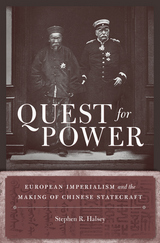
China’s history in the nineteenth and early twentieth centuries has often been framed as a long coda of imperial decline, played out during its last dynasty, the Qing. Quest for Power presents a sweeping reappraisal of this narrative. Stephen Halsey traces the origins of China’s great-power status in the twentieth century to this era of supposed decadence and decay. Threats from European and Japanese imperialism and the growing prospect of war triggered China’s most innovative state-building efforts since the Qing dynasty’s founding in the mid-1600s.
Through a combination of imitation and experimentation, a new form of political organization took root in China between 1850 and 1949 that shared features with modern European governments. Like them, China created a military-fiscal state to ensure security in a hostile international arena. The Qing Empire extended its administrative reach by expanding the bureaucracy and creating a modern police force. It poured funds into the military, commissioning ironclad warships, reorganizing the army, and promoting the development of an armaments industry. State-built telegraph and steamship networks transformed China’s communication and transportation infrastructure. Increasingly, Qing officials described their reformist policies through a new vocabulary of sovereignty—a Western concept that has been a cornerstone of Chinese statecraft ever since. As Halsey shows, the success of the Chinese military-fiscal state after 1850 enabled China to avoid wholesale colonization at the hands of Europe and Japan and laid the foundation for its emergence as a global power in the twentieth century.
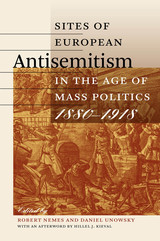
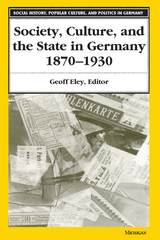
Work on the Kaiserreich built up impressive momentum during the 1970s and 1980s, when a series of inspiring but divisive controversies called into question the ways in which German historical development in the nineteenth and twentieth centuries was mainly understood. These discussions focused on issues of continuity between Bismarck and Hitler and the peculiar strength of authoritarianism in German political culture, raising important questions about the deep origins of Nazism and about Germany's alleged differences from the West.
The collection purposefully brings certain issues and approaches into the foreground. These include the value of taking gender seriously as a priority of historical work; the emergence of social policy and welfare during the early twentieth century; religious belief and affiliation as a neglected dimension in modern German history; the tremendous importance of the First World War as a climacteric; and the exciting potentials of cultural studies and the new cultural history.
A varied group, the contributors embrace different kinds of history and certainly do not subscribe to a common line. Some essays suggest alternative periodizations and focus on the early twentieth century decades rather than the integral unity of the Kaiserreich as such. Together, they take stock of the field, critically synthesizing existing knowledge and laying down agendas for the future.
Geoff Eley is Professor of History, University of Michigan.

As a study of the greatest middle class party of Imperial Germany, The Splintered Party is inevitably, in its broadest aspect, an inquiry into the weaknesses of liberalism in the Empire of Bismarck and Wilhelm II. How did the National Liberals, the dominant force in the Reichstag of the 1870s, become by 1914 a spent and divided power? Dan White explores this question from a new perspective, emphasizing regional circumstances as primary agents of the party’s decline. The resulting portrait underscores the paradox of the National Liberals: a party with strength in all areas of the Empire, a rarity before 1914, yet a party whose impact was undermined by divisions among its regional branches.
In The Splintered Party the former Grand Duchy of Hessen serves as a testing ground where the regional foundations of National Liberalism can be exposed. As Professor White points out, the party’s reversals on the Imperial plane after 1878—rejection by Bismarck, electoral defeats, internal splits—not only ended its early primacy in German affairs but also shifted political initiative from Berlin and the Reichstag delegation to the National Liberal branches in the states and provinces, which had maintained unity, power, and alliances with local government in spite of the upheaval above them. The consequences of this change become visible through close examination of the political and social structure in Hessen. On the regional level a liberalism based on the claim to majority representation by the notables (Honoratioren) of bourgeois society, a creed no longer plausible in national politics, remained defensible. Through the Heidelberg Declaration of 1884 the National Liberals of the German Southwest attempted to buttress this approach with an economic and social platform and, simultaneously, to make it the impulse of the national party’s revival. But they succeeded only in deferring National Liberalism’s adjustment to democratic politics and in subordinating their movement to the clash of regional and constituency interests. The result was a chronically splintered party.
Against the backdrop of this main theme, White delineates several additional features of the changing political and social scene in Imperial Germany—the local power of the notables, Bismarck’s skills as a political manager, the character of agrarian discontent and rural anti-Semitism, the steady advance of socialism. The uniquely German element in National Liberalism’s failure is assessed in a concluding comparison with the development of liberal politics in Britain and Italy.
READERS
Browse our collection.
PUBLISHERS
See BiblioVault's publisher services.
STUDENT SERVICES
Files for college accessibility offices.
UChicago Accessibility Resources
home | accessibility | search | about | contact us
BiblioVault ® 2001 - 2024
The University of Chicago Press









